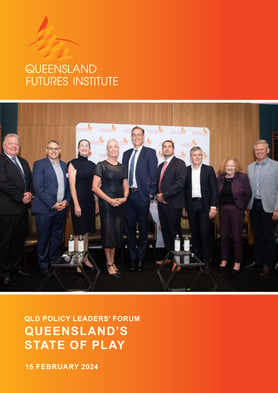|
The key theme from the 2024 Queensland Futures Institute’s Policy Forum Queensland’s State of Play was the critical need for collaborative, informed policymaking in the lead up to this year’s Queensland election. The discussion outlined the opportunities across the property, agriculture, resources and tourism industries given the current economic environment and technological advancements such as AI – highlighting the role of industry, government and the education sector to work collaboratively to drive economic growth.
The discussion also highlighted challenges around workforce and skills development, capital availability and insurability challenges faced by businesses, and the need for a robust policy response to address these issues.

|

|
SPEAKERS
|
|
|
|

|
 |
 |
Andrew Barger
Policy Director, Economics,
Queensland Resources Council |
Kirsty Chessher-Brown
Chief Executive Officer,
UDIA Queensland |
Michelle Farquhar
Head Queensland,
Ai Group
|
|

|
 |
 |
Brett Fraser
Chief Executive Officer,
Queensland Tourism Industry Council |
Michael Guerin
Chief Executive Officer,
AgForce Queensland |
Professor Margaret Sheil AO
Chair of the Queensland Vice-Chancellor's Committee
|
|

|

|
|
Moderator: Dr Sam MacAulay
Senior Lecturer & Deputy Director
(Academic) MBA and Executive Education
UQ Business School |
SUMMARY OF PANEL COMMENTS
- Queensland businesses are working through a challenging economic environment, resulting in cost,
supply chain and workforce pressures across industries. There will also be a high level of geopolitical
uncertainty in the year ahead given the prevalence of elections this year.
- In light of these challenges, it will be critical to foster meaningful, substantive policy debates as
we approach the Queensland election. Government, industry and the education sector must work
collaboratively in policymaking to achieve this.
- Queensland businesses must understand how they can leverage developments and continue to deliver
value in this environment. This will include adopting AI to enhance the capability and output across
industry, revolutionising the ways we work.
- It remains critical to foster a competitive business environment in Queensland which attracts and
retains a skilled workforce and facilitates the capital investment we require for economic growth.
PANEL QUESTIONS
What opportunities and challenges are prominent as we look to the year ahead for your industry?

|
Kirsty Chessher-Brown
- I represent the property development industry, particularly residential
property developers.
- We’re still experiencing a high level of demand for housing despite challenges
around the rental crisis and significant affordability challenges.
- These challenges have been driven largely by supply-side factors, including delivery and supply chain issues – particularly for Southeast Queensland, and infrastructure funding issues for detached housing, and construction delays – particularly for apartments.
- This is reflected in the current crane index of Brisbane, which is experiencing a
significant slump.
- The feasibility of apartment construction is limited – and is currently only being seen for construction on sites which have been purchased at the right price – as well as premium and blue-chip sites.
- The pressure on construction costs is significant and has shifted since Covid –
towards being driven by productivity and program prolongation.
- Despite these challenges, the industry is optimistic about opportunities
in Queensland.
|

|
Michelle Farquhar
- I have just joined Ai group and have just spent some time in Canberra discussing
current opportunities for the industry and recent industrial relations legislation
being passed.
- This legislation has been contentious, with ongoing reviews and potential
amendments to reflect the challenges currently being faced by businesses, such as
the right to disconnect.
- There is a strong need for balance and ongoing discussion between society and
businesses on these issues to ensure employers can adapt to the regulatory burden
being placed on them.
- Discussions also covered competitiveness, productivity, access to capital and the
potential impacts of global events, such as the upcoming U.S. presidential election,
and the great unknown of AI – and what these mean for businesses.
|

|
Andrew Barger
- The Queensland Resources Council is currently running a ubitquitous advertising
campaign around coal royalty policy, which asks the Government to keep
Queensland competitive.
- The QRC represents a broad spectrum of the industry covering exploration, mining,
refining, energy, minerals, gas, and coal. Over 80% of Queensland’s export revenue
comes from our resources industries.
- The industry is currently dealing with the uncertainty around Queensland’s royalty
policy and the lack of genuine engagement with the government.
- Despite the strong conditions, customers, investors and producers have highlighted
that there is real uncertainty around the current policy environment. This is a
result of the recent government interventions in the sector, such as the gas and
coal price caps.
- There are some positive signals from the government, particularly in the critical
mineral space. Despite policy and investment uncertainty and geopolitical risk, critical
minerals will likely become a significant opportunity for Queensland.
- To take advantage of this opportunity, it will be critical to rebuild investment certainty
for customers, investors and producers over the coming years. There will be a strong
emphasis on providing raw materials – including aluminium, zinc and other materials
which will be needed to support the next generation of products and growth areas
such as Queensland’s energy resources such as wind farms, battery minerals and
hydrogen opportunities.
|

|
Michael Guerin
- While Queenslanders have enjoyed food security for generations, there is an
opportunity to raise some important advocacy discussions in the lead up to this year’s
state election.
- The agriculture industry can meet the increasing demand for food whilst also creating
jobs and boosting economic activity – but can also be powerful in solving the climate
and environmental issues we face. It will be critical to balance food security with
environmental concerns going forward.
- The agriculture industry in Queensland is well placed to engage with both sides
of politics as well as communities to facilitate important policy conversations, such
as around the live animal export debate. These conversations are important to
challenge misinformation that is prevalent across the industry, particularly around the
environmental impacts of agriculture.
- The industry is optimistic around the opportunities we will have to facilitate these
conversations this year.
|

|
Brett Fraser
- The tourism industry is well placed to take advantage of opportunities in the current
economic environment. While we have had a strong couple of years from domestic
tourism, we still face challenges, particularly around international visitors to the state.
- The bulk of visitation in Queensland over the last two years has come from domestic
visitors, however with the reopening of international borders, we are starting to see
more Australians choosing to travel abroad. To date, we have not seen the return of
international visitors to Queensland, resulting in a net deficit of international travellers.
- While international aviation capacity is rebuilding, we are have not yet reached
capacity levels equal to that of 2019.
- This is happening alongside other challenges being faced by the industry – namely,
increasing costs of doing business and increasing cost of living for consumers.
- The tourism industry in Queensland relies heavily on capital investment made in
previous years and it is becoming increasingly important for the industry to invest
capital in new and existing product, however the complexity of approvals and red tape
are stifling investment.
- It will be critical to address these challenges to facilitate industry growth and
reinvestment in the coming years.
|

|
Professor Margaret Sheil AO
- Universities are currently anticipating the release of the Commonwealth
Government’s University Accord review that will be released later this month and
will outline a framework and 47 recommendations for the sector. These will likely
focus on educational disadvantage and improving access to higher education – with
a target of 50% of the Australian population having some form of higher education
by 2050. This may also deliver greater coherence between higher education and
vocational education pathways.
- However, this will likely include greater regulation and may not deliver additional
research investment that has been advocated for by the sector. The review will likely
also establish a tertiary education commission that will provide opportunities for
differentiation between pathways.
- This is particularly helpful for the significant challenge around the loss of revenues
from international students in recent years. The sector is also experiencing lower
domestic demand from students – with the same number of enrolments as 2019.
This is driven by low unemployment and increasing cost of living, which is resulting
in students being unable to focus on education and subsequently taking on lighter
study loads.
- Despite these challenges, the industry is optimistic around the opportunities for new
and growing industries as well as a rebound in international enrolments. However,
to deliver this there is a strong need for adequate funding to support workforce
education and research – and develop education and technology capability that
industry requires. Coherent pathways between the vocational education and training
(VET) sector and higher education is also critical to deliver this.
- While these challenges may be similar to other sectors, Queensland benefits from
high-quality universities and institutions with strong research capability and is well
positioned to support strong growth moving forward.
|
As you gaze into your crystal balls for 2024, what’s one low probability, high impact event from
policy, technology, environment, and society that leaders in your industry have their eyes on?
What processes or tools are you using to monitor these?

|
Kirsty Chessher-Brown
- Local government elections are equally important as State elections for the
property industry.
- In terms of low probability, high impact developments – we are continuously
monitoring the evolution of modern methods of construction (MMC) across
Queensland. While the industry is currently exploring the use of this method, we
continue to monitor the cost effectiveness of this in terms of cost of materials and
logistics. This method is comparable to traditional methods in terms of cost but may
deliver productivity gains – particularly considering the decentralised nature of the
construction industry across Queensland.
- This is low probability as it has been attempted in other cities globally but has not
yet found a successful path to implementation. As such, despite these challenges,
it is important to continue the conversation and advocacy around the adoption of
innovative solutions in the property industry in Queensland.
|

|
Michelle Farquhar
- Given the probability of a Trump presidency, we have considered the impacts
of this in terms of our relationship with China and the flow-on implications for
supply chains.
- Regardless of the US election result a potential scenario could include a sea
blockade, impacting our supply chains, particularly with China, Taiwan, South Korea,
Vietnam, and Singapore.
- Actions to mitigate the impact of this scenario could include shifts in manufacturing
– for example, giving rise to local or modular manufacturing, which could utilise
3D printing technology. Additionally, stockpiling is another option. From anecdotal
evidence, we have already seen increasing construction of warehouse space as
businesses increase their inventories.
- Ai Group is working closely with the Office of Supply Chain Resilience (OSCR) to
build processes and systems to help build resilience and protect Australia in this
scenario. This includes roundtable discussions with industry to capture insights, and
feed back suggestions to policy makers at OSCR.
|

|
Andrew Barger
- It is likely that we will see a high level of geopolitical uncertainty given the broad
prevalence of elections this year – across many international jurisdictions as well as
Queensland at both the local and State level.
- Against this backdrop of democracy, the low probability, high impact event I would
like to see is meaningful, substantive policy debates. A genuine policy contest must
include all stakeholders of the political process – not just politicians, but also
civil society.
|

|
Michael Guerin
- Land-use and natural capital is a significant area in the agriculture industry which
would have high impact but is contentious and unlikely to be adequately discussed.
- We have seen the contentiousness of this issue across parts of Europe, such as in
the tractor protests against climate-based targets for agriculture.
- Despite this, there are many opportunities to develop natural capital for Queensland.
The international frameworks – such as the Taskforce on Nature-related or Climate Related Financial Disclosures (TNFD/TCFD) – provide guidance around this and can be leveraged to provide a significant benefit to the Queensland agriculture industry.
- Given Queensland’s broad landscape – which is home to 13 unique bioregions, with
84% of the land being in its natural state – building better natural and environmental
outcomes in Queensland will have a significant impact, not only for the agriculture
industry but also future generations.
- This is therefore an important issue to be discussing as we enter this year’s election
and is a key area of focus for the AgForce Young Producers’ Council.
- Separately, it is also important to be discussing the current review into supermarket
pricing given the role this will play in including producers and the agriculture industry
within the broader policy conversation.
|

|
Brett Fraser
- A key risk for the tourism industry is that of extreme weather events which we
have seen becoming increasingly prevalent, and as recently as December and
January. The increasing frequency of these events underscores the importance of
sustainability and highlights the need for better preparedness for businesses and
communities across Queensland.
- The recent examples of unexpected weather events in Cairns highlights the
adverse outcomes associated with overlooking the probability of these events.
There is clearly a strong need for resilience across local and state governments as
well as industry – particularly given the greater impacts of these events on public
infrastructure, such as roads and water.
- Additionally, the Commonwealth and State Government must come together to
assist industry address the cost and availability to insure against these events.
|

|
Professor Margaret Sheil AO
- Given the prevalence of low probability events with significant impacts in recent
years, it is important to develop the ability to respond to these and any other events
or concerns we might face in the future.
- Coherent investment in research and development would support Queensland and
Australia in developing solutions to address these challenges in the long-term. Any
investment in research to support this area would therefore have a high impact,
despite the low probability of such adverse events occurring.
|
We’re now seeing firms like Microsoft and Adobe rolling out general purpose artificial intelligence
models like ChatGPT into the workplace. There’s a lot of debate around when, or even if, this will
substantially impact how work gets done in 2024. Do you believe this will substantially impact your
industry in 2024? (If so, how? If not, why not?)

|
Michael Guerin
- AgForce has recently assessed the benefits of AI in the systems used by the
agriculture industry. Unsurprisingly, AI will have significant impacts for the industry
and in the workplace. While there may be a learning curve to its adoption, it will
enhance the capability and output across industry and revolutionise the way we
work. Proactive adoption will be critical as businesses leverage this technology.
|

|
Brett Fraser
- Many of the industries larger businesses have already adopted AI technologies for
some time. A good example is the travel booking websites.
- AI technology is being considered and adopted by SMEs across the industry more
broadly, however there are greater barriers to adoption.
- We must support SMEs and the broader industry to achieve the gains already seen
by larger businesses and overcome barriers to entry faced by SMEs
|

|
Professor Margaret Sheil AO
- AI has been a focus of the education sector for some time, with academics and
experts driving conversations around its use. The sector is currently considering
how to best integrate the use of the technology into courses and programs, which
echoes previous adoption of technologies, such as integrity checkers.
- The education sector has an opportunity to ensure that students are fully engaging
with new technologies, such as AI to drive innovation in their future workplaces.
|
What’s one future policy initiative we could start working on today that would provide the best
opportunity to create value for Queenslanders?

|
Kirsty Chessher-Brown
- There are many aspects to the policy discussions and reform which could help
address the housing crisis. UDIA Queensland has found that community sentiment
around some of these policies has shifted significantly, highlighting an opportunity to
drive conversation and tackle this issue.
- It is critical to attract businesses to Queensland, particularly head contractors as,
while there is a significant skilled workforce in Queensland, we are experiencing a
head contractor shortfall. This reflects a perception of risk in doing business in the
state which the Queensland Government must address in order to support
the industry.
|

|
Michelle Farquhar
- Attracting and retaining a skilled workforce remains a key issue for Queensland.
We must address the declining number of apprenticeships and high dropout rates
across the state.
- Potential solutions to this issue could include developing initiatives for mature age
entry into apprenticeships or introducing school students to industry at a younger
age (i.e. middle school years) through collaborative education experience with
industry and training providers.
- As new industries are developed, it will be increasingly important to ensure a high
level of flexibility and adaptability of skills across our workforce.
|

|
Andrew Barger
- It is critically important to maintain a high level of quality and transparency in
policy debates. This requires fact-based discussions and consideration of different
viewpoints. If implemented, this would result in better solutions and more
effective policymaking.
|

|
Michael Guerin
- We must continue to advocate for the role of the agriculture industry to
concurrently contribute to food security whilst also delivering environmental
solutions for Queensland.
- For example, three years ago, an AgForce committee developed of view of what
was needed from legislative targets to be held to account for environmental impacts.
This led to a joint launch six months ago of a lower emissions pathway, built
collaboratively between government and industry. This highlights the importance of
collaboration, as well as the need for being open to these discussions.
|

|
Brett Fraser
- The Queensland economy requires new capital investment and reinvestment to
drive its growth. To achieve this and support existing and new businesses, it is
critical to ensure a strong and competitive environment.
- We must strike a balance between a supportive economic environment in which
businesses can operate and an adequate level of government regulation. As
such, there is a need to re-evaluate how Queensland’s current regulations support
businesses, investment, employment, and opportunities for economic growth.
|

|
Professor Margaret Sheil AO
- The Closing the Gap Report released this week highlights several areas of
regression across educational disadvantages, out of home care, and high rates
of incarceration.
- We must develop more effective solutions to address these issues and improve
outcomes across communities. Investing in these areas now, such as through
addressing school shortages, will ensure better long-term outcomes and reduce
long-term costs.
|
What can be done to recognise prior qualifications of international migrants and unlock
this workforce?

|
Professor Margaret Sheil AO
- International qualification is a complex area which involves accrediting bodies,
universities and industry. While we have a strong internationally qualified workforce,
it can be challenging to provide opportunities for training and recognition of skills
through professional accrediting bodies.
- Collaboration across the sector is needed to address workforce shortages. This is
a key focus area which would benefit from further work. One example of the work
being done to support this is that of Jobs and Skills Australia – a new agency trying
to achieve alignment across the sector to achieve this.
|
How are private capital markets responding to the concern of climate change? Where is capital
going across Queensland industry to support resilience against natural disasters?

|
Brett Fraser
- Capital markets play a significant role for industry to grow. This is particularly
important when considering business resilience and insurability.
- We are currently seeing very low availability of insurance, particularly for businesses
in northern Queensland. This is having a negative impact on access to capital.
- This highlights the importance for long-term sustainability plans for businesses
across Queensland to attract investors and capital.
|

|
Michael Guerin
- The agriculture industry benefits from having mature frameworks around
sustainability, which is an advantage compared to other industries. While the
industry has adapted to UN frameworks and emissions reporting requirements,
it is important to continue highlighting the stories around agriculture production
across Queensland.
- AgForce has driven the development of AgCarE (Agriculture Carbon and the
Environment) for the past six years, giving the industry an advantage in being an
early adopter to delivering on sustainability efforts.
|
What is your sector doing to be more engaging and more effectively communicate the value
proposition of Queensland industry in the lead up to the election?

|
Michelle Farquhar
- It is critically important to communicate the successes and value delivered by
businesses and industry and showcase the innovation of the Queensland economy.
Reflecting this, Ai Group has recently run its first TikTok campaign, via its Apprentice
and Trainee Centre.
- This form of communication highlights the importance of unpacking industry concepts
– such as advanced manufacturing – to demystify buzz words and effectively communicate the opportunities for Queensland. This will become increasingly
important as businesses look to adapt and utilise new forms of technology,
particularly around robotics and AI, such as Computer Aided Design (CAD), Computer Numerical Control (CNC) and Computer Aided Manufacturing (CAM).
- There is also a need for education and training around the transition of businesses
incorporating these new technologies and new business innovations – engagement
is critical to achieving this.
|

|
Michael Guerin
- Engagement and communication are critical, particularly for the agriculture industry
in sharing the views and issues faced by businesses. We must highlight the role of
farmers in providing a secure food supply chain and the agricultural practices which
communities take for granted. This provides a firm foundation to support robust
policy conversations, particularly given the upcoming election.
|


































